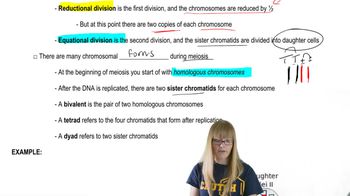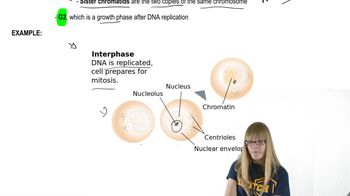Here are the essential concepts you must grasp in order to answer the question correctly.
Meiosis
Meiosis is a specialized form of cell division that reduces the chromosome number by half, resulting in four genetically diverse gametes. It involves two rounds of division (meiosis I and II) and includes processes such as crossing over and independent assortment, which shuffle genetic material. This genetic recombination is crucial for sexual reproduction and contributes to the genetic diversity of offspring.
Recommended video:
Mitosis
Mitosis is the process of cell division that results in two genetically identical daughter cells, maintaining the same chromosome number as the parent cell. It involves a single round of division and is primarily used for growth, repair, and asexual reproduction. Since mitosis does not involve recombination or reduction of chromosome number, it does not contribute to genetic variation.
Recommended video:
Genetic Variation
Genetic variation refers to the differences in DNA sequences among individuals within a population. It is essential for evolution and adaptation, as it provides the raw material for natural selection. In meiosis, mechanisms like crossing over and independent assortment create new combinations of alleles, leading to increased genetic diversity, whereas mitosis produces clones with no variation.
Recommended video:
 Verified step by step guidance
Verified step by step guidance Verified video answer for a similar problem:
Verified video answer for a similar problem:

